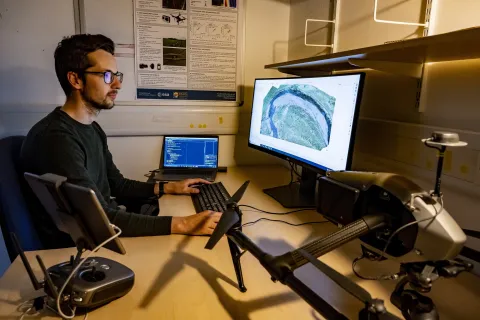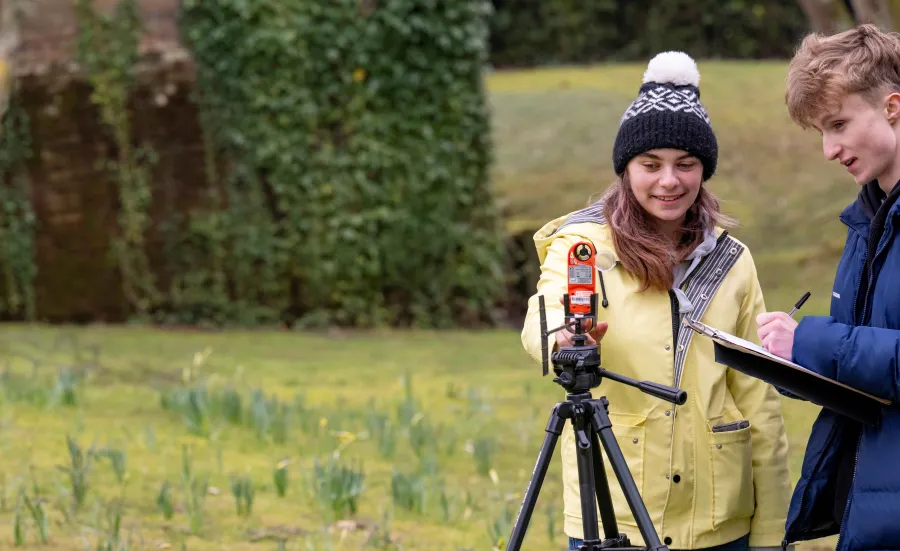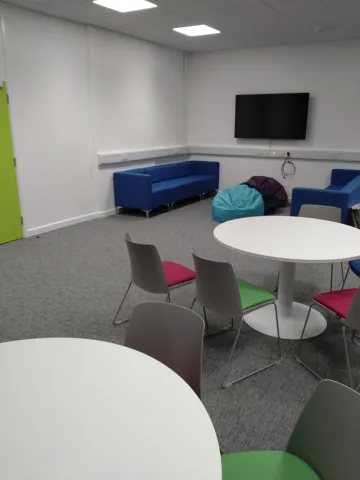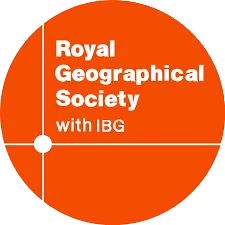Facilities


Understand how people, places and environments shape one another in this BA Geography degree. You’ll graduate with the knowledge, practical, and transferable skills that employers value, preparing you for your career as a geographer.
Over 3 years, you’ll study both human and physical geography, learning how social, economic, political and cultural forces interact. As you progress you'll have the chance to specialise in human geography with optional modules. This will allow you to personalise your study experience, exploring global challenges like:
During your studies you'll use advanced tools like Geographical Information Systems (GIS) to investigate how communities live and work across our interconnected planet. You’ll be taught by world-leading researchers in a top UK geography department. Their research influences global debates on sustainability, health and wellbeing, urbanisation, AI, migration and politics, giving you insight into how geography shapes the world.
On this course you'll learn by doing. You'll apply classroom knowledge to environments in the UK and overseas, visiting urban and rural landscapes. There are trips available to take each year in every year. This includes a residential trip to Amsterdam fully covered by your tuition fees and options to visit Berlin, Cambodia or Namibia in later years.
These experiences will deepen your understanding of the relationships between people and place, strengthen your practical research skills, and help you stand out to future employers.
You’ll receive dedicated support throughout your degree. Your personal academic tutor will help you plan your studies, choose modules, and explore career goals.
You can also:
Our welcoming and supportive Geography society also hosts a range of academic and social events all year, providing community and additional opportunities throughout your degree.
We regularly review our courses to ensure and improve quality. This course may be revised as a result of this. Any revision will be balanced against the requirement that the student should receive the educational service expected. Find out why, when, and how we might make changes.
Our courses are regulated in England by the Office for Students (OfS).

Studying here is enriching and eye-opening. In Geography specifically, studying has some really amazing experiences such as our first, second, and third year field trips to diverse locations like Amsterdam, Tenerife, and Cambodia.

The project brought people together to focus on the incredibly important issue of homelessness. To find a sustainable solution to homelessness as a society, we all need to be on the same page and working on this together.


This course is based at Highfield.
This qualification is awarded by the University of Southampton.
The Course Description Document details your course overview, your course structure and how your course is taught and assessed.
ABB
Offers typically exclude General Studies and Critical Thinking.
If you are taking an EPQ in addition to 3 A levels, your offer will be: BBB and Grade A in the EPQ
We are committed to ensuring that all applicants with the potential to succeed, regardless of their background, are encouraged to apply to study with us. The additional information gained through contextual data allows us to recognise an applicant's potential to succeed in the context of their background and experience. Applicants who are highlighted in this way will be made an offer which is lower than the typical offer for that programme: Grades BBC
Pass, with minimum 32 points overall with 16 points at Higher Level
We are committed to ensuring that all learners with the potential to succeed, regardless of their background, are encouraged to apply to study with us. The additional information gained through contextual data allows us to recognise a learner’s potential to succeed in the context of their background and experience. Applicants who are highlighted in this way will be made an offer which is lower than the typical offer for that programme.
Offers will be made on the individual Diploma Course subject(s) and the career-related study qualification. The CP core will not form part of the offer. Where there is a subject pre-requisite(s), applicants will be required to study the subject(s) at Higher Level in the Diploma course subject and/or take a specified unit in the career-related study qualification. Applicants may also be asked to achieve a specific grade in those elements. Please see the University of Southampton International Baccalaureate Career-Related Programme (IBCP) Statement for further information. Applicants are advised to contact their Faculty Admissions Office for more information.
DDM in the BTEC Extended Diploma. DD in BTEC Diploma plus B in an A-Level subject. D in the Subsidiary Diploma plus AB from 2 A-level subjects.
We are committed to ensuring that all learners with the potential to succeed, regardless of their background, are encouraged to apply to study with us. The additional information gained through contextual data allows us to recognise a learner’s potential to succeed in the context of their background and experience. Applicants who are highlighted in this way will be made an offer which is lower than the typical offer for that programme.
DDM in the BTEC Extended Diploma. DD in BTEC Diploma plus B. D in the Subsidiary Diploma plus AB from 2 A-level subjects.
We are committed to ensuring that all learners with the potential to succeed, regardless of their background, are encouraged to apply to study with us. The additional information gained through contextual data allows us to recognise a learner’s potential to succeed in the context of their background and experience. Applicants who are highlighted in this way will be made an offer which is lower than the typical offer for that programme.
60 credits with a minimum of 45 credits at Level 3, of which 30 must be at Distinction and 15 credit
We are committed to ensuring that all learners with the potential to succeed, regardless of their background, are encouraged to apply to study with us. The additional information gained through contextual data allows us to recognise a learner’s potential to succeed in the context of their background and experience. Applicants who are highlighted in this way will be made an offer which is lower than the typical offer for that programme.
H1 H2 H2 H2 H3 H3
We are committed to ensuring that all learners with the potential to succeed, regardless of their background, are encouraged to apply to study with us. The additional information gained through contextual data allows us to recognise a learner’s potential to succeed in the context of their background and experience. Applicants who are highlighted in this way will be made an offer which is lower than the typical offer for that programme.
Offers will be based on exams being taken at the end of S6. Subjects taken and qualifications achieved in S5 will be reviewed. Careful consideration will be given to an individual’s academic achievement, taking in to account the context and circumstances of their pre-university education.
Please see the University of Southampton’s Curriculum for Excellence Scotland Statement (PDF) for further information. Applicants are advised to contact their Faculty Admissions Office for more information.
D3 M2 M2
Cambridge Pre-U's can be used in combination with other qualifications such as A Levels to achieve the equivalent of the typical offer where grade D3 can be used in lieu of grade A or M2 can be used in lieu of grade B.
We are committed to ensuring that all learners with the potential to succeed, regardless of their background, are encouraged to apply to study with us. The additional information gained through contextual data allows us to recognise a learner’s potential to succeed in the context of their background and experience. Applicants who are highlighted in this way will be made an offer which is lower than the typical offer for that programme.
ABB from 3 A Levels if one or more preferred subjects are included or AB from 2 A levels if one or more preferred subjects are included and B from the Advanced Skills Baccalaureate Wales.
Offers typically exclude General Studies and Critical Thinking.
We are committed to ensuring that all learners with the potential to succeed, regardless of their background, are encouraged to apply to study with us. The additional information gained through contextual data allows us to recognise a learner’s potential to succeed in the context of their background and experience. Applicants who are highlighted in this way will be made an offer which is lower than the typical offer for that programme.
An overall distinction with grade A in the core element in the Science T-Level
Applicants must hold GCSE English language (or GCSE English) and Mathematics at minimum grade 4/C.
Find the equivalent international qualifications for our entry requirements.
If English is not your first language, you must show that you can use English to the level we require. Visit our English language pages to find out which qualifications we accept and how you can meet our requirements.
If you are taking the International English Language Testing System (IELTS), you must get at least the following scores:
If you do not meet the English language requirements through a test or qualification, you may be able to meet them by completing one of our pre-sessional English programmes before your course starts.
You might meet our criteria in other ways if you do not have the qualifications we need. Find out more about:
Find out more about our Admissions Policy.
A foundation programme will give you the language skills and subject knowledge you need if you're not qualified for direct entry to your chosen undergraduate course.
You'll progress to your chosen course after successfully completing the foundation programme.
Find out more about undergraduate foundation programmes for international students.
We welcome applications from learners of all ages. Students who are aged 21 and over at the start of their undergraduate course are defined as mature by the University of Southampton. We take a holistic assessment of the application looking for academic ability and commitment to study. Typical entry requirements, which may vary from discipline to discipline, includes for example, evidence of recent formal academic qualifications or professional qualifications, relevant work experience or volunteering. You may also be invited to attend an interview with an Admissions Tutor. For some degree programmes, there may also be a Professional, Statutory and Regulatory Body (PSRB) requirement. We accept many different academic qualifications. For more information, please contact the Admissions Team.
Please contact our enquiries team if you're not sure that you have the right experience or qualifications to get onto this course.
Email: enquiries@southampton.ac.uk
Tel: +44(0)23 8059 5000
This degree consists of a set of core and compulsory modules and a selection of optional modules. You can choose your options from:
A major part of all our degree programmes is the research project. This involves personal fieldwork or documentary research, in the UK or abroad.
You'll develop your topic with a member of staff who will give ongoing supervision. You'll start the project in your second year, and complete it in your final year.
In your first year you'll get a broad academic foundation in human and physical geography. Statistical and computing skills are also an important element in the early part of the degree.
Modules in this year will explore concepts across human and physical geography, with a focus on resilience and sustainability in the context of climate change.
In this year you'll visit the Southampton Cultural Quarter, where you'll examine both human and physical geography topics.
In year 2 you'll take core modules in human geography research and start to specialise in geographies focused on areas like:
You'll learn the basic concepts and techniques behind Geographical Information Systems and be able to take some optional physical geography modules. You can also take up to 2 modules outside geography, for example, looking at global health issues or demographic issues.
In this year you'll have the option to travel to Amsterdam for a residential trip to study human geography research. All travel, food and accommodation on this trip is included in your tuition fee.
Your third year offers a broad range of advanced options to choose from. These are based on the research interests of academic staff, and bring you to the frontier of current knowledge in geography.
Whether migration and development, social justice or climate adaptation fascinates you, you'll get a sense of cutting-edge issues and debate.
You'll also have an optional travel opportunity in this year, choosing from Berlin for a human geography focus or Cambodia or Namibia if you want to combine human and physical geography. These trips are at an extra cost.
This is also the year in which you'll complete your final research project
Want more detail? See all the modules in the course.
The modules outlined provide examples of what you can expect to learn on this degree course based on recent academic teaching. As a research-led University, we undertake a continuous review of our course to ensure quality enhancement and to manage our resources. The precise modules available to you in future years may vary depending on staff availability and research interests, new topics of study, timetabling and student demand. Find out why, when and how we might make changes.
As well as the optional modules listed here, you can also choose from a range of modules from other disciplines across the University. You'll find more information about module choices in the programme specification under 'About this course'.
You must study the following modules in year 1:
The module aims to introduce students to the broad topic of globalisation. As a team-taught module, specific topics may change with occasional changes to the teaching team. At the time of writing, specific topics include: trade and the global economy (e.g...
To give the student a basic knowledge of the main geomorphological processes involved in the shaping of the landscape. Pre-requisite of GEOG3020/GGES13. One of the pre-requisites for GEOG2032/GGES2011, and GEOG3057/GGES3019.
Explorers visit and observe different places in order to further understand the physical and cultural phenomena they encounter. This module will introduce you to methods enabling you to explore physical and human environments, in order to collect data wh...
The purpose of the module is to develop students’ ability to undertake field research in geography by practice-based learning on a fieldtrip and associated lectures. The module will give practical experience of carrying out research to ensure practical...
The module will explore risk, hazard, exposure, vulnerability, resilience, and sustainability, all in the context of climate change: how these concepts relate to the Earth's physical and ecological systems, and to cultural and socio-economic structures of...
This module aims to explore the historical development, nature and importance of Geography as a field of study, as well engaging with recent developments around what it means to be a Geographer today. It will introduce students to the key academic skills...
This module introduces students to social and economic change, cultural diversity and spatial organisation in cities and western societies. The module also provides an introduction to three main fields in human geography - urban geography, social geograph...
The module will look at the challenges posed to human societies living on a dynamic planet and how these societies adapt (or not) to a range of environmental and socio-economic hazards. Pre-requisite for GEOG2006 One of the pre-requisites for GEOG...
As well as the optional modules listed here, you can also choose from a range of modules from other disciplines across the University. You'll find more information about module choices in the programme specification under 'About this course'.
You must study the following modules in year 2:
The module will introduce the concepts and techniques underpinning geographic information systems.
This module prepares students to undertake an independent research project as part of their final undergraduate year. In the first section of the module students will participate in a series of workshops covering a range of methods which they may wish to...
This module introduces students to a range of concepts, approaches and data collection methods in human geography.
You must also choose from the following modules in year 2:
The module will look at the conceptual, practical and methodological issues associated with using GIS for environmental and socio-economic applications.
Coastal zones represent a small fraction of physical space on the Earth, but they are exceptionally important places to study physical and ecological dynamics of environmental change – in natural and anthropogenic systems, alike. This module examines n...
Most states claim to be democratic. This module looks at the theory of democracy, including foundational questions about political inclusion, participation, and equality. As a result, students will develop a greater understanding of what democracy require...
According to the United Nations, India has now overtaken China as the most populous country in the world. Since the introduction of economic liberalisation policies in early 1990s, India has emerged as the world’s sixth largest economy in terms of nominal...
Freshwater Ecosystems initially considers the interplay between the physics, chemistry and biology of freshwater ecosystems. A comparative approach is adopted, in which upland streams, lowland rivers, lakes and other standing freshwater environments are c...
In contemporary neoliberal societies individuals are increasingly positioned as responsible for their own wellbeing. In the first half of this module we look at how health and wellbeing are often reduced down to a lifestyle choice. But is health and wellb...
The module aims to introduce students to field of critical development and issues related to poverty, inequality, injustice and policy. As a team-taught module, specific topics may change with occasional changes to the teaching team.
The topic is addressed from three perspectives: the science of climate change, impact and adaptation, and policy towards adaptation and mitigation. One of the pre-requisites for GGES3019
The global health module is an exciting opportunity to examine the factors associated with emerging and re-emerging infectious diseases such as the recent outbreak of Ebola and Swine Flu that quickly spread around the world, and non-communicable diseases ...
The global challenge that is 'sustainability' impacts every dimension of all of our lives. Regardless of your degree, the social, cultural, economic and environmental dimensions of sustainability have important implications for your studies, your daily ...
This module will explore how humans have been impacting the planet over recent millennia, and how more recently the increased impacts are leading to tipping points in many global systems, from biogeophysical to social. As such the module will discuss a ra...
In a world of fast and easy communication, we are increasingly working and studying alongside people from different cultural and linguistic backgrounds. Understanding our intercultural encounters allows us to develop awareness of ourselves and others, as ...
The purpose of the module is to develop students’ ability to undertake research in human geography by building on what they have learnt related to methods and research design in Geog2008 and practice-based learning on a fieldtrip and associated lectures, ...
Are we really alone in the Universe? That's a question that has been asked across the centuries and is always evolving. The course will discuss all the environmental circumstances that seem to encourage the start of any life form and investigate the c...
GGES2004 examines long-term environmental change through the period of the glacial-interglacial cycles. These dramatic shifts in Earth's systems are fascinating to study because they show us how the environment reacted to rapid climate change in the past ...
The module will look at key concepts in cultural geography.
This module aims to introduce you to the variety of demographic experiences in low and middle-income countries across the world, particularly in sub-Saharan Africa, Latin America and the Caribbean and, Asia. We will explore the patterns of historical and...
This module will explore the issues of race, racism, racial conflict, and race relations in contemporary Britain and worldwide. Although we will mainly refer to Britain, global examples will also be used. The module will examine theoretical perspectives o...
The module will look at the basic theory and practical application of remote sensing for monitoring the terrestrial environment.
This module provides an introduction to the sub-discipline of urban geography and the topics and approaches it covers, including urbanisation, urban development, urban policy, current urban challenges, and current debates in urban geography.
An understanding of the physical, chemical and biological processes involved during contamination of air, water and soil is essential if society is going to effectively monitor and control the effects of pollution using modern technology and engineering p...
As well as the optional modules listed here, you can also choose from a range of modules from other disciplines across the University. You'll find more information about module choices in the programme specification under 'About this course'.
You must study the following module in year 3:
You must also choose from the following modules in year 3:
GGES3019 is a multidisciplinary unit designed for students with an interest in how individuals and societies understand and respond to environmental shocks and stresses, and their different capacities for adaptation. The focus of the module is on climate ...
This advanced field course module is delivered as a residential fieldcourse to Namibia (primarily based at the Gobabeb Namib Research Institute). It is designed for students interested in all aspects of physical geography, human geography and environment...
The module will look at the conceptual, practical and methodological issues associated with geospatial analysis for environmental and socio-economic applications.
The core of this module is a fieldtrip to Berlin. This fieldtrip is used to address questions about the production of urban space in twentieth-century Western Europe. Topics include: modern urbanism and architecture; political ideologies and monuments; ...
Most states claim to be democratic. This module looks at the theory of democracy, including foundational questions about political inclusion, participation, and equality. As a result, students will develop a greater understanding of what democracy require...
Some of the biggest uncertainties in climate change predictions come from our lack of understanding of the impact of some of the smallest airborne dust particles. These dust particles are transported between continents from some of the hottest and most u...
According to the United Nations, India has now overtaken China as the most populous country in the world. Since the introduction of economic liberalisation policies in early 1990s, India has emerged as the world’s sixth largest economy in terms of nominal...
Health and the provision of health care are important issues in our everyday lives. Many of the debates surrounding health are inherently spatial in nature and as such geographers are well placed to play an important role in informing research and providi...
This course seeks to make use of innovative and cutting edge technologies in the field of Earth surface process monitoring to address the real world challenges encountered by commercial and/or governmental organisations. Students on this module will ta...
There has been growing interest in the past few years in how cities and regions respond and adapt to rapid, and often turbulent, economic change, and why some cities and regions appear much more successful than others in coping with and taking advantage o...
The module will introduce perspectives on gender drawn from social theory, and explore contemporary debates about gender and society.
This is a Module not about learning new facts or figures, or necessarily huge swathes of substantive knowledge about food consumption and food production (a dominant theme). Rather it invites you to develop a repertoire of theories and concepts to think c...
The module will introduce students to critical geographical themes as they relate to welfare, rights and social justice, including the state and territorialisation, community, confinement, deinstitutionalisation, landscapes of care, fragmentation and loca...
To investigate the modern research into glacial processes, to investigate analytical approaches to test contemporary controversial problems and to show how these processes formed the present day landscape
The global health module is an exciting opportunity to examine the factors associated with emerging and re-emerging infectious diseases such as the recent outbreak of Ebola and Swine Flu that quickly spread around the world, and non-communicable diseases ...
The global challenge that is 'sustainability' impacts every dimension of all of our lives. Regardless of your degree, the social, cultural, economic and environmental dimensions of sustainability have important implications for your studies, your daily ...
In a world of fast and easy communication, we are increasingly working and studying alongside people from different cultural and linguistic backgrounds. Understanding our intercultural encounters allows us to develop awareness of ourselves and others, as ...
GGES3020 is a multidisciplinary unit designed for students with an interest in human migration and development and the interaction between the two. The module will emphasise the importance of place and scale in its approach to these themes, although it wi...
Nature Based Solutions (NBS) – actions to protect, sustainably manage, and restore natural or modified ecosystems – can play a critical role in mitigating not only climate change, but also increasing other benefits from nature (ecosystem services) that hu...
This module will explore the issues of race, racism, racial conflict, and race relations in contemporary Britain and worldwide. Although we will mainly refer to Britain, global examples from Europe, the US, the Caribbean, Africa, and South America will b...
To develop an holistic approach to river basin management and restoration based on an understanding of physical processes and human modification of natural river systems.
GGES3021 is a module designed for students who are interested in the creative economy and how it is being shaped by geographical processes related to globalisation, digitisation and flexibilisation. The module will cover topics that are central to underst...
The Professional Geographer is a high-level skills practical module. The module aims to help students understand the changing nature of work, the dynamic and diverse labour market for geography graduates and to develop skills, knowledge and experience to ...
The learning activities for this course include the following:
How you'll spend your course time:
Your scheduled learning, teaching and independent study for year 1:
Year 1:
Your scheduled learning, teaching and independent study for year 2:
Year 2:
Your scheduled learning, teaching and independent study for year 3:
Year 3:
You’ll be supported by a personal academic tutor and have access to a senior tutor.
Rishika Mukhopadhyay is the course leader.
This degree will allow you to develop and evidence subject-specific and targeted employability skills. This includes the required skill set for a range of future careers, further study, or starting your own business.
The skills you can expect to focus on and gain from this course include:
The employability and enterprise skills you'll gain from this course are reflected in the Southampton skills model. When you join us you'll be able to use our skills model to track, plan, and benefit your career development and progress.
Download skills overview
Graduates commonly work in a range of organisations or sectors including:
Business and Consultancy,
Geospatial and Technical careers,
Environmental and Sustainability roles,
Policy, Planning and Governance,
Development and Advocacy,
Education and Outreach,
Media and Creative Industries,
Further Study and Academia.
*Example graduate job titles and job prospect statistics taken from The Graduate Outcomes Survey, which gathers information about the activities and perspectives of graduates 15 months after finishing their course.

You can apply for a year in employment placement on this course. This is a great way to improve your employability and confidence in your career prospects. Recommended by 100% of students who've taken part, you can apply for a UK or global placement in any sector.
We are a top 20 UK university for employability (QS Graduate Employability Rankings 2022). Our Careers, Employability and Student Enterprise team will support you. This support includes:
We have a vibrant entrepreneurship culture and our dedicated start-up supporter, Futureworlds, is open to every student.
Your career ideas and graduate job opportunities may change while you're at university. So it is important to take time to regularly reflect on your goals, speak to people in industry and seek advice and up-to-date information from Careers, Employability and Student Enterprise professionals at the University.
Fees for a year's study:
Your tuition fees pay for the full cost of tuition and standard exams.
Find out how to:
Accommodation and living costs, such as travel and food, are not included in your tuition fees. There may also be extra costs for retake and professional exams.
Explore:
If you're a UK or EU student and your household income is under £36,200 a year, you may be able to get a University of Southampton bursary to help with your living costs. Find out about bursaries and other funding we offer at Southampton.
If you're a care leaver or estranged from your parents, you may be able to get a specific bursary.
Get in touch for advice about student money matters.
You may be able to get a scholarship or grant to help fund your studies.
We award scholarships and grants for travel, academic excellence, or to students from under-represented backgrounds.
The Student Hub offers support and advice on money to students. You may be able to access our Student Support fund and other sources of financial support during your course.
Find out about funding you could get as an international student.
We will assess your application on the strength of your:
We'll aim to process your application within 2 to 6 weeks, but this will depend on when it is submitted. Applications submitted in January, particularly near to the UCAS equal consideration deadline, might take substantially longer to be processed due to the high volume received at that time.
We treat and select everyone in line with our Equality and Diversity Statement.
Please contact our enquiries team if you're not sure that you have the right experience or qualifications to get onto this course.
Email: enquiries@southampton.ac.uk
Tel: +44(0)23 8059 5000
Geography (BA) is a course in the Geography and environmental science subject area. Here are some other courses within this subject area:
